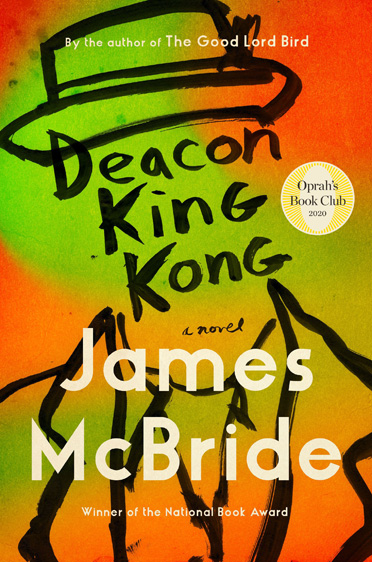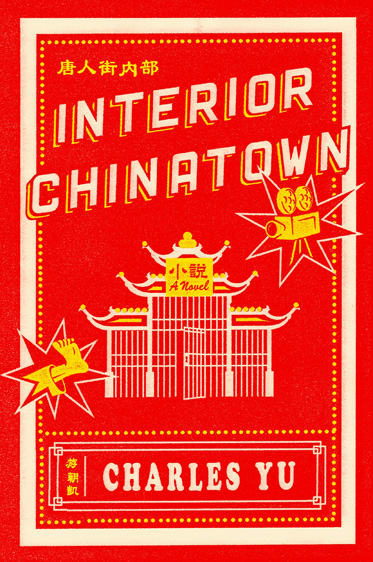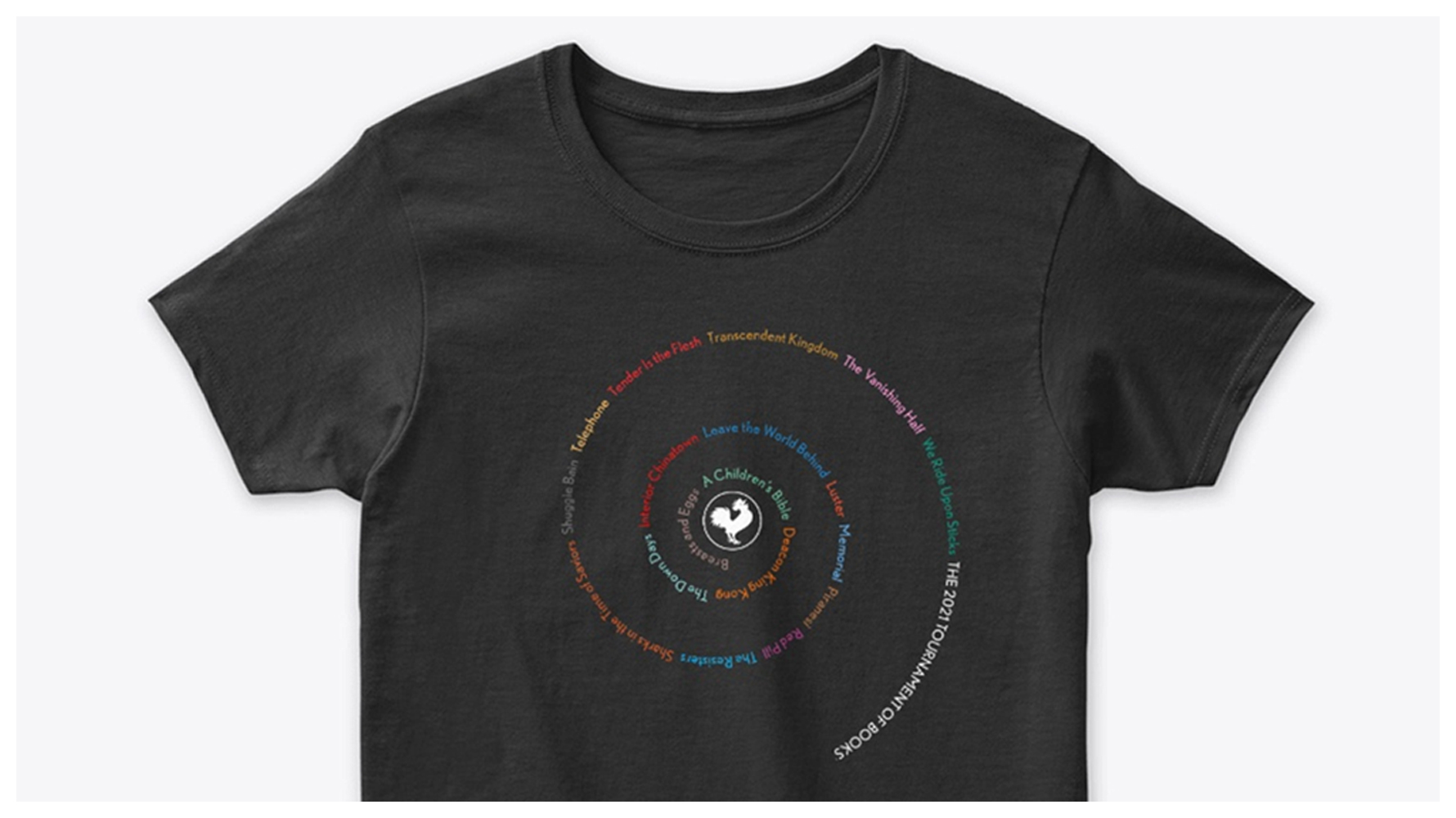-
March 25, 2021
Semifinals
-
James McBride
1Deacon King Kong
v.
2Interior ChinatownCharles Yu
-
Judged by
Catherine Chung
Reading Interior Chinatown, I kept thinking of a conversation I had recently with a friend who was shocked to hear that as an Asian American, I grew up in this country feeling like I was seen as perpetually foreign, never-to-be-truly American. My friend, who is white, said none of his other immigrant friends or friends of color had ever told him they felt this way. I pointed out I wasn’t an immigrant, and then trotted out a list of recent and past threats, taunts, humiliations, and attacks. He noted that I was allowing other people to define what it meant to be an American in a way that diminished me, and wondered why I would allow them that power. What could I say? He lives in an America where these things are a matter of personal choice. I realize now that we were each using our own experiences in this country to debate what America was, and who we were and could be within it. Predictably, though perhaps not inevitably, tensions arose as we insisted on our own ways of seeing it. It is a confusing and oftentimes distressing thing to live in one country that is simultaneously so many different countries that feel so at odds with each other—as if the existence of one should surely make the others impossible. My friend and I live here together, and yet the country I know and the country he knows are along certain metrics so different as to be nearly unrecognizable to the other. And while it occurs to me that this a defining principle of the country we live in, it can still feel—in confronting this abyss—as if one’s sanity or morality or safety is under attack.
The particular genius of Interior Chinatown is how audaciously it maps out this abyss and these related but separate realities, and shows us the ways they compete and obscure and are blind to each other. Written in screenplay form, the book illustrates how one man’s exotic backdrop for a movie can mark the limits of another man’s future, while the second-person telling scrambles the reader’s experience of identity and agency in a way that mimics the character’s own. Willis Wu, our protagonist, has spent his life in a set piece of Chinatown that doubles as his home and the home of the other Asian actors who work there, playing variations on “Generic Asian Man Number Three/Delivery Guy” and “Generic Asian Man Number Two/Waiter.” The dream, for Willis, is to work his way up to Kung Fu Guy, even though he’s seen his own father’s decline from mysterious Kung Fu Master fighting on rooftops to Old Asian Man in a stained undershirt. That there are no better roles, Willis explains, is not the result of “some overarching conspiracy to exclude Asians but because it’s just easier to keep it how we have it. […] The decision is made but it’s not a decision at all, it’s the opposite. It’s the way things are.”
The writing throughout is biting and funny, but the stakes are serious, and the cost of “the way things are” is erasure. As a young boy in Taiwan, Willis’s father survives unspeakable horrors to come to America as a brilliant grad student who is ultimately denied a job because his unaccented English makes potential employers uncomfortable. He takes on a fake accent to get work in Chinatown as Young Asian Man, and is swallowed up in the roles he must play: gangster, cook, “inscrutable, mystical, nonsensical Oriental.” Willis’s mother, a woman who once caught a pot of scalding water in her own hand to protect Willis from injury—a hero in her own right, I’m saying—is likewise reduced to playing roles like Dead Beautiful Maiden Number One and Pretty Oriental Flower before being relegated to Old Asian Woman, and her relationship with her son is strained by the embarrassment of how far their lives are from what they want for each other. I did wish I’d gotten to know Willis’s mother, and later his wife, better—that we were given as rich a sense of their lives and the trajectories of their dreams as we were for Willis and his father. I loved Willis’s father for his decency and ambition and stoicism: It is heartbreaking to witness in small strokes how he’s diminished by the roles he takes on, how his imagination shrinks to fit the roles offered him. It’s chilling to consider how the collective imagination also shrinks and hardens around these roles, so that Willis, born a generation later into “a pretend version of the old country,” grows up performing a fake accent, dreaming of one day becoming the Kung Fu Guy his father had to settle to be.
Is there any way to get out of Chinatown? First, Interior Chinatown suggests, we must break out of the scripts we are given and resist falling into an endless set of new traps trying to get better parts in which we’ll still just be saying our lines. When Willis meets and falls in love with his future wife Karen, she explains, “Telling a love story is something one person does. Being in love takes both of them.” Love isn’t enough, though, to set Willis free, and in a hilarious, highwire scene involving a courtroom, a kung fu fistfight, the Black and white stars of a police procedural show, and all the residents of Chinatown (and some who have left)—Interior Chinatown seems to say it will take everyone—all of us—letting go of the stories we’re so sure of, the ones we cling to and live by and are trapped in, that tell us who we are and who we get to be, and who we see (and who sees themselves) as the heroes. Reading this book was like getting to see the world in X-ray, where the underlying structure of so many things I’ve spent my life thinking about—human, historical, national—were suddenly at long last made visible.
There’s a full range of Note Books and related stationery products at fieldnotesbrand.com. Field Notes is proud to once again be a sponsor of the Tournament of Books.
While reading Interior Chinatown set off a series of continuous epiphanies in my mind about living in this world and this time, reading Deacon King Kong was a completely immersive experience, in which the world around me disappeared and I was fully transported into the Cause Houses of Brooklyn, 1969. When I finished, all weepy, I realized I’d taken no notes whatsoever, and wrote down, “I don’t know that I’ve ever loved any character as much as I love Sportcoat.” It took me some time to gather my wits. Which is to say, Deacon King Kong was an experience, and Sportcoat, “a wiry, laughing brown-skinned man who had coughed, wheezed, hacked, guffawed, and drank his way through the Cause Houses for a good part of his 71 years,” the freewheeling, irresistible hero of this very twisty-turny book, delighted me at every turn, upending every narrative expectation, and cracking me up and breaking my heart as he did.
I did wish with this book as well that I could know the women better, beyond and separate from their relationships to the men. (I called a friend and asked if there’s a term for the trope where a woman’s main function in a story is to further a man’s plotline, to help him along on his journey, and she said, “I think the word you’re looking for there is just ‘woman.’”) Even so, everyone in this savagely funny book—from the drug dealer whose ear Sportcoat shoots off, to the fearsome gangster called The Elephant, to the ghost of Sportcoat’s wife Hettie, to his best friend Hot Sausage, to the cop, to the dozens of other characters McBride somehow manages to fit into this book—is treated with immense generosity and a divine comedic grace, as when a henchman sent to thwack Sportcoat is accidentally knocked in the head two times and electrocuted once, thwarted, but intact enough to return to try again. On the last attempt, the unlucky fellow is carried, unconscious, to a train station by Good Samaritans who relieve him of his switchblade, sit beside him until he wakes, and then gently send him on his way, his weapon returned to him. It was at this moment where I was really struck by the fact that this book is not just about faith, but born of faith. I was moved by its expansive and humane rendering of this faith, which motivates so many acts of goodness that coalesce into a series of coincidences that feel not contrived, but miraculous and revelatory, like a proof of the goodness of God.
And boy do we need the miracles, the electrifying writing, that giddy sense of relief every time catastrophe is averted and the sense that God is on the side of these people, because this book is brutal in the way it suddenly reveals the absolute rage that lies beneath the surface of our lovely, happy-go-lucky hero, Sportcoat. If he seems blissfully, sweetly carefree as he careens through life unheeding of all predictions of death it is because he is a man living accustomed to his own doom, and I realized, writing this, that the kind of love I feel for Sportcoat—ardent, protective, unconditional—is the kind I generally reserve for children when I’m moved by their innocence. And I realized, too, that Sportcoat’s innocence, which is the source of his purity, is only possible because it’s preserved by his drinking, which keeps him from having to be fully in the world and in touch with his rage. What a humbling thing to be taught by a book, that what you were hoping for was the wrong thing all along. What Sportcoat needs is not to swerve away from catastrophe and pain but to face it, and for all the love and talent and joy he carries, that is a colossal and excruciating task.
Both Deacon King Kong and Interior Chinatown were exhilarating reads. Deacon King Kong is populated by unforgettable, irrepressible characters, and though the constraints of time and place, race, poverty, history, and grief are omnipresent, the characters so rich and dazzling, and the imagination behind them so boundless, that the narrative itself felt free and unencumbered, like the story could go anywhere and do anything, like anything was possible. Interior Chinatown is exquisitely written, endlessly inventive, moving, and sharp, but what really struck me was the way it illuminated so much that is usually otherwise hidden—the bit players in the shadows, certain quiet gestures full of humanity, injustices we take for granted or don’t even see, the mechanisms we live by that make inequality and misunderstanding inevitable. After reading it, I felt like I’d grown new eyes or activated dormant neural pathways in my brain, and that things that had been hazy and hidden from me were now suddenly clear. Since I need to choose just one of these books to advance, let me just say, I loved Deacon King Kong, but Interior Chinatown is a book I’ve been waiting my whole life to read.
Match Commentary
By Kevin Guilfoile & John Warner
Kevin Guilfoile: Wow, another wonderful judgment for the 2021 Rooster. Judge Chung not only provides us with a brilliant assessment of these two novels (two of my own favorites from this year), she gives us a beautiful rendering of what it felt like for her to read them. That kind of expression is the burning core of what the ToB has become for me over the years.
John Warner: I’m thinking about how the novel and this judgment resonate with even greater force in light of the rash of anti-Asian violence in this country, how our previous president and a number of his henchmen still traffic in racist tropes, and how Interior Chinatown makes it clear why it has be so easy for them to get away with it without sanction.
Kevin: We’ve basically been through a four-year exercise by people who want to define an “American” as someone of white, European descent. The violence we’ve seen, especially in the past year, is a clear consequence of that, but it’s also an idea that has always simmered in the American consciousness. Obviously, Yu couldn’t have predicted the specific events of the last 12 months, but Interior Chinatown couldn’t be more timely.
You and I have talked about it before, but there seems to be a correlation in this country between the declining numbers of people reading fiction and an overall decline in empathy. One thing that I keep returning to as I read about the experience others had with Interior Chinatown, and as I revisit my own reading of it, is that as an argument, the book seems irrefutable. I can’t imagine someone coming at it from a critical perspective and attempting to say, “Well, sure, but…” Even after you acknowledge that this premise is super high-concept—and even if you can identify structural limitations of the device along the way—you also realize that Yu has built an airtight container for his point. Even without the life experience Judge Chung brings to the reading (and I certainly have spent less time over the years contemplating the subject), I turned the pages of Interior Chinatown thinking to myself, “These things are obviously True.” That is a rare feeling, and extremely satisfying.
John: I had the same feeling about Judge Chung’s judgment. I gasped at her final line. Granted, I am prone to visceral reactions to prose, it’s why I read so much, after all, but it landed with such deep satisfaction, I had to take a second or two to let it wash over me.
Kevin: Deacon King Kong was my “good company” novel of 2021 (to borrow again a phrase Lorrie Moore has used to measure a book’s success). I just loved going back to it over the days that I read it. I looked forward to reading it when I was not. I missed it after I was done.
John: For me, Deacon King Kong surpasses The Good Lord Bird, which is saying something because that’s also a book that I recommend often. McBride’s books are just full of life at every level—language, character, incident. As I read Judge Chung’s recounting of some of the book’s episodes, I was smiling in reminiscence. That is actually a pretty rare feat for a book, that the experience of reading is so embedded in your consciousness that you can experience a nostalgia for your own moment of first encounter.
Kevin: The sheer number of named characters populating this story is kind of staggering, and I would need scissors and string to figure out how McBride is able to so effortlessly keep them all straight for us. It’s virtuosic. Years ago, Spy Magazine published an index of Andy Warhol’s Diaries (which contained an insane amount of name-dropping), and I’m almost tempted to create a similar document for Deacon King Kong. Judge Sean Hooks described the pleasure of encountering all these characters in his quarterfinal judgment, and I would read with pleasure a simple list of the character names from this book: Sportcoat. Deems. Hot Sausage. Sister Gee. The Elephant. Miss Izi. Jet. Pudgy Fingers. Lightbulb. Bum-Bum. Golly Honey Gibson. (Actually, someone has tried to compile one! I’m pretty sure it’s not even close to being complete.)
John: It’s like Pynchon, but more folksy. I can’t gainsay the judgment for a moment, but I am sorry to see Deacon King Kong go. I’m hoping the next thing you tell me is that it’s coming back from the dead in the next round.
Kevin: Well, Interior Chinatown moves on to meet a resurrected novel in the Zombie Round. And Deacon King Kong was a popular book, and it is so pleasurable to read that you’d expect it to get a lot of love in the Zombie poll, and you’d be right. But it does not have enough votes to dethrone either Piranesi and The Vanishing Half, two books that are just one match away from getting a return invite to the Rooster barn.
Tomorrow, Breasts and Eggs will take on Red Pill, and it’s up to the thumb of Grace Perry to decide which one will move on.
New 2021 Tournament of Books merch is now available at the TMN Store. As a reminder, Sustaining Members receive 50 percent off everything in our store. To find out why we’re asking for your support and how you can become a Sustaining Member, please visit our Membership page. Thank you.
Welcome to the Commentariat
Population: You
To keep our comments section as inclusive as possible for the book-loving public, please follow the guidelines below. We reserve the right to delete inappropriate or abusive comments, such as ad hominem attacks. We ban users who repeatedly post inappropriate comments.
- Criticize ideas, not people. Divisiveness can be a result of debates over things we truly care about; err on the side of being generous. Let’s talk and debate and gnash our book-chewing teeth with love and respect for the Rooster community, judges, authors, commentators, and commenters alike.
- If you’re uninterested in a line of discussion from an individual user, you can privately block them within Disqus to hide their comments (though they’ll still see your posts).
- While it’s not required, you can use the Disqus <spoiler> tag to hide book details that may spoil the reading experience for others, e.g., “<spoiler>Dumbledore dies.<spoiler>”
- We all feel passionately about fiction, but “you’re an idiot if you loved/hated this book that I hated/loved” isn't an argument—it’s just rude. Take a breath.




